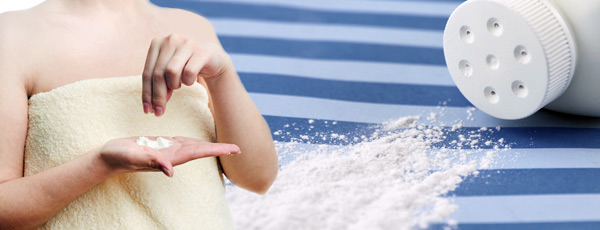Jury awards $72M in J & J baby powder case
Posted in Drug & Medical Devices, Health & Wellness on March 8, 2016
 On Feb 22, a jury in Missouri awarded $72 million in damages to the family of Jacqueline Fox, a woman who died of ovarian cancer after using Johnson’s Baby Powder for genital hygiene for decades. Fox was just one of thousands of women from across the country who filed claims against Johnson & Johnson for failing to warn consumers of the dangers associated with talc, the mineral used in baby powder.
On Feb 22, a jury in Missouri awarded $72 million in damages to the family of Jacqueline Fox, a woman who died of ovarian cancer after using Johnson’s Baby Powder for genital hygiene for decades. Fox was just one of thousands of women from across the country who filed claims against Johnson & Johnson for failing to warn consumers of the dangers associated with talc, the mineral used in baby powder.
During the trial, Fox’s attorneys presented a September 1997 internal memo from a J & J medical consultant, which criticized the company for claiming that studies at the time did “not demonstrate any real association” between talcum powder and ovarian cancer. The memo reads in part:
At that time [1994] there had been about 9 studies (more by now) published in the open literature that did show statistically significant association between hygienic talc use and ovarian cancer. Anybody who denies this risks that the talc industry will be perceived by the public like it perceives the cigarette industry: denying the obvious in the face of all evidence to the contrary.
The St. Louis Post-Dispatch reported that one juror, Jerome Kendrick, 50, found Johnson & Johnson’s internal memos to be very compelling. “They tried to cover up and influence the boards that regulate cosmetics,” Kendrick said. “They could have at least put a warning label on the box but they didn’t. They did nothing.”
How does talcum powder cause cancer?
Talc is a mineral that is one of the main ingredients in Johnson’s® Baby Powder and Shower to Shower. Like asbestos, talc is a silicate that has been studied in relation to cancer risk. Studies spanning more than three decades indicate that manufacturers of powders containing talc have failed to warn consumers of serious health risks. Researchers have found that when women apply baby powder in the genital area, talc fibers can migrate through the reproductive system to the ovaries. These fibers can cause the ovaries to become inflamed and affect the immune system, increasing a woman’s risk of developing ovarian cancer by as much as 30 percent.[1]
Ovarian cancer is often deadly
Although Fox initially brought the civil suit, her son took over as plaintiff following his mother’s death in October—just two years since her diagnosis. According to the American Cancer Society, ovarian cancer only accounts for about 3 percent of cancers among women, but it causes more deaths than any other cancer of the female reproductive system. Following the widespread media coverage of this landmark case, women across the country have grown worried about the link between talcum powder and ovarian cancer.
Thousands of women with ovarian cancer have filed talcum powder lawsuits across the country and Elk & Elk is actively pursuing new claims on behalf of victims and their families. If you have been diagnosed with ovarian cancer and have questions about talcum powder, contact the experienced attorneys at Elk & Elk for a free, confidential case review.
The case is Hogans et al v. Johnson & Johnson et al, Circuit Court of the City of St. Louis, Missouri, No. 1422-CC09012.
Source:
[1] A 2013 study indicated that women who use powder containing talc in the genital area have a 20% to 30% higher risk of ovarian cancer than those who do not. (Terry KL, Karageorgi S, Shvetsov YB, Merritt MA, Lurie G, Thompson PJ et al. Genital Powder Use and Risk of Ovarian Cancer: A Pooled Analysis of 8,525 Cases and 9,859 Controls. Cancer Prev. Res. 2013;6:811-21.)